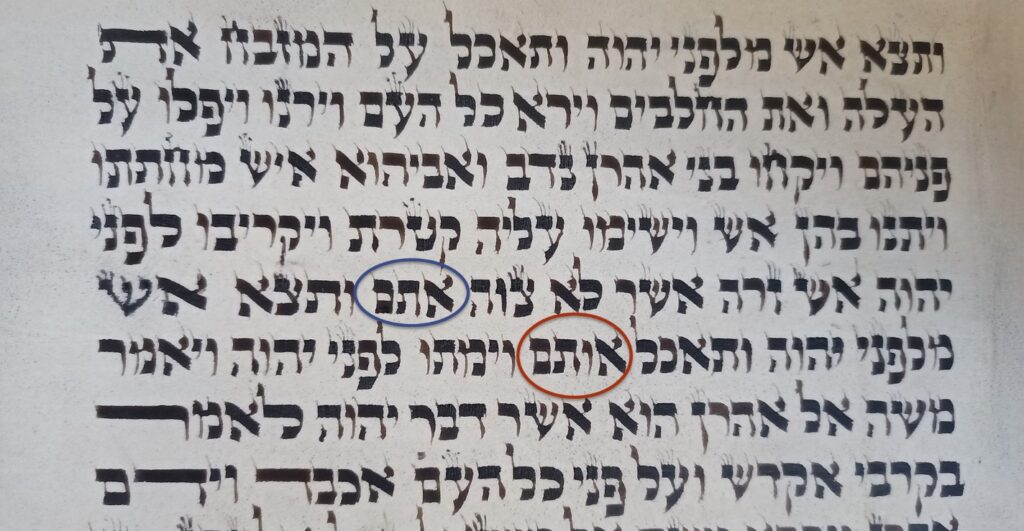The Story, or the Facts at Hand, in a nutshell.
Parashat Shemini (The Eights Day) takes off right after the seven days that Aharon and his sons followed the commandment to stay in the Tabernacle (the Tent of Convene). They were, most probably, fasting, atoning for their sins in preparation to start their service to the People of Israel and the Work of God. The Eights Day is a celebration – a holy day.
Aharon is preparing to perform all the sacrificial work on his own. The process involves atoning for his own sins and for those of his household first, and to atone for the sins of the People of Israel. Aharon sets and arranges the sacrifices on the altar precisely according to the prescribed order.
Then, Aharon raises his hands and bestows the blessing upon the people of Israel. In an act of approval, the Presence of God is seen by the people, and heavenly fire consumes all the sacrifices that were on the altar. The People seeing this vision are in awe, bow down deeply so their faces touch the ground and praised the Holy One Blessed be He.
Nadav and Avihu follow the acts of their father, Aharon. However, they probably divert from the exact specific instructions, and set “an alien fire” in their own fire pans. The same heavenly fire that a few minutes ago consumed the sacrifices is burning them to death.
Appalling. Why? Capital Punishment for the first occurrence of a mistake? What is alien, strange, fire?
On One Hand…
Let us look how these verses appear in Torah:

The word “OTAM”, which means them, appears here twice (circled in the image above). However, with a slightly different spelling: the first (circled in blue) – “no one commanded them” is written with three letters, without the letter Vav. The second (circled in red) – “the fire consumed them” is written with 4 letters, including the Vav.
Ba-al HaTurim (Rabbi Ya-akov Ben Asher) concludes two things from this anomaly.
The first conclusion is about the second appearance of the word OTAM (them) with the Vav. The numerical value (Gematria) of that word is 447. So is the numerical value of the statement “that is the soul” – זֶה הַנֶפֶשׁ. Out of this equality he concluded that HaShem took their souls.
In addition, he says, the missing letter Vav – which equals 6 – means that they missed [=sinned] on 6 accounts (supporting his assertion with quotes from other sources and commentaries):
- The “Alien Fire” means that they took the fire from the kitchen, rather from the altar [Vayikra Raba 20:8];
- Nadav and Avihu acted arrogantly by making their own ruling in the presence of their teachers, Moshe and Aharon;
- They were drunk;
- Both of them did not marry and had no sons. This fact alluded to their high self-absorption and vanity – there is no one worthy their own status [Vayikra Rabba 20:10];
- They tried to make excessive profits from their position and the services they provided; and
- Neither of them consulted, nor took advise from anyone else – not even from each other [Vayikra Rabba 20].
We may get the notion that Nadav and Avihu are sinful, bad and wicked persons that deserve the worst of punishments: to be burnt in the fire of hell. Is it really so?
On the Other Hand…
Verse 10:3 provides a hook to a different, opposite, interpretation of the story:
Then Moshe said to Aharon, “This is what Adonai meant by saying: Through those near to Me I show Myself holy, And gain glory before all the people.” Aaron was silent.
וַיֹּ֨אמֶר מֹשֶׁ֜ה אֶֽל אַהֲרֹ֗ן הוּא֩ אֲשֶׁר דִּבֶּ֨ר יְהֹוָ֤ה לֵאמֹר֙ בִּקְרֹבַ֣י אֶקָּדֵ֔שׁ וְעַל פְּנֵ֥י כׇל הָעָ֖ם אֶכָּבֵ֑ד וַיִּדֹּ֖ם אַהֲרֹֽן׃
Rashi relies on Talmud and Midrash Rabba as he interprets this verse:
THIS IS WHAT THE LORD SPOKE, etc. — Where had He spoken this? In the statement (Exodus 29:43):
“There I will meet by the Children of Israel and (the Tabernacle) shall be sanctified by My glory (בִּכְבוֹדִי).”
וְנֹעַדְתִּ֥י שָׁ֖מָּה לִבְנֵ֣י יִשְׂרָאֵ֑ל וְנִקְדַּ֖שׁ בִּכְבֹדִֽי׃
The Talmud (Tractate Zevaḥim 115b) says: Do not Read here בִכְבוֹדִי – [sanctified] “by My glory” but rather read בִּמְכֻבָּדַי – [sanctified] “through My honored ones”.
To better understand this enigmatic play on words, Rashi quotes now Vayikra Rabba 12:2:
Rabbi Shmuel Son of Naḥman says: Moshe heard this saying from HaShem when he was on Mount Sinai. However, he didn’t really understand the meaning of the saying, until the death of Nadav and Avihu happened. Only then Moshe could actually connect the true meaning of that statement to their death.
Moshe then said to Aharon: “My brother, Aharon! When I was on Mount Sinai, HaShem told me that He will sanctify this House, with a great man who is the Omnipresent loves. I thought that He would sanctify the House either through me or through you. Now I see that your sons who have died are greater than me and you!” Once Aharon heard that his sons were Yir’ey Shamayim – full of awe to God (or fearful of God), he remained silent.
Rashi continues to explain: AHARON WAS SILENT – He (Aharon) received a reward for his silence. What was the reward that Aharon receive? That the Divine subsequently addressed him alone and not together with Moshe (Leviticus 10:8): ‘Adonai spoke to Aaron, saying:’.
And Back to the One Hand…
We do understand that Nadav and Avihu did something wrong. They did not follow the exact protocol that they just learned how to perform. Following the protocol precisely the way it is prescribed makes it holy. By not FULLY obeying the Directives that they did not understand the rationale for, they desecrated the ritual. One can adopt any of the arguments we listed above to justify (or not) the severity of the punishment.
We know that the Mishkan, the Tabernacle, was built exactly to “specs” HaShem gave. Because of that precise execution, the Shekhina, the Divine Presence, blessed it by filling it completely. So much so that there was no room for Moshe; that is why HaShem called Moshe “Vayikra” [the name of the book Leviticus] to come close. A plausible conclusion from this conversation is that following the rituals, obeying rules even when we do not really understand the reasoning for them, create sanctity.
